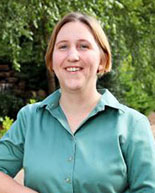Share this article:
Share this article:
Two scientists who perform research at FRIB have received U.S. Department of Energy Office of Science (DOE-SC) Early Career Research Program awards.
The program, in its eighth year, awards financial support to scientists from universities and DOE national labs to help advance their research. Research proposals are peer-reviewed and selected by one of the following six offices: Advanced Scientific Computing, Biological and Environmental Research, Basic Energy Sciences, Fusion Energy Sciences, High Energy Physics, and Nuclear Physics. Out of about 700 proposals, fifty-nine were selected for the 2017 fiscal year.
Kelly Chipps

Photo courtesy of Oak Ridge National Laboratory/U.S. Department of Energy
FRIB user Kelly Chipps, a Liane B. Russell Fellow working in the Oak Ridge National Laboratory (ORNL) Physics Division, will receive funding for her proposal, "Next-Generation Particle Spectroscopy at FRIB: A Gas Jet Target for Solenoidal Spectrometers," selected by the Office of Nuclear Physics.
Chipps is one of more than 1,400 FRIB users engaged and ready to conduct science at FRIB. She is the leader of the Jet Experiments in Nuclear Structure and Astrophysics (JENSA) collaboration at FRIB. The collaboration developed and installed a pure, recirculating gas jet target system on a dedicated beamline at the National Superconducting Cyclotron Laboratory (NSCL) in anticipation of reaccelerated beams from NSCL and, in the future, FRIB. Her research seeks to study exotic, unstable nuclei and nuclear reactions that power the stars by combining the benefits of the sophisticated state-of-the-art solenoidal spectrometer at Argonne National Laboratory and the JENSA system developed at ORNL. The project promises to resolve challenges to achieving high-resolution and low-background particle spectroscopy when applied to FRIB. The Early Career Research award will help her determine if the gas jet target system can work with a solenoidal spectrometer. This would allow researchers to understand the limitations in charged-particle spectroscopy.
“I’m excited because the Early Career Research award allows me to pursue the combination of two techniques,” said Chipps. With the award, she will be able to build a prototype with the Helical Orbit Spectrometer (HELIOS) at Argonne National Laboratory.
Check out the video ORNL produced about Chipps’s research.
Heiko Hergert

Heiko Hergert, an MSU assistant professor of physics with a joint appointment in the National Superconducting Cyclotron Laboratory (NSCL) and FRIB, was selected by the Office of Nuclear Physics for his proposal, “Advanced Ab Initio Methods for Nuclear Structure.”
Hergert’s research focuses on using novel theoretical methods and large-scale computer simulations to model nuclei based on the fundamental interactions between the protons and neutrons they are made of.
“The exotic nuclei that FRIB will be able to produce are excellent laboratories for teasing out the fine details of these fundamental interactions,” said Hergert. “By confronting our calculations with new experimental data, we will be able to close important gaps in our understanding.” Reliable simulations of such nuclei require theoretical and computational advances whose development are a central goal of his Early Career Research proposal.
Hergert said he is honored to be a recipient of this highly competitive award.
Hergert earned both his master’s degree and PhD from Technische Universität Darmstadt in Germany. In 2009, he began his postdoctoral research at NSCL before transitioning to Ohio State University to continue his postdoctoral research.
From 2014 to 2015, he worked as a theory fellow at NSCL/FRIB and in 2015 he became an assistant professor of physics.

